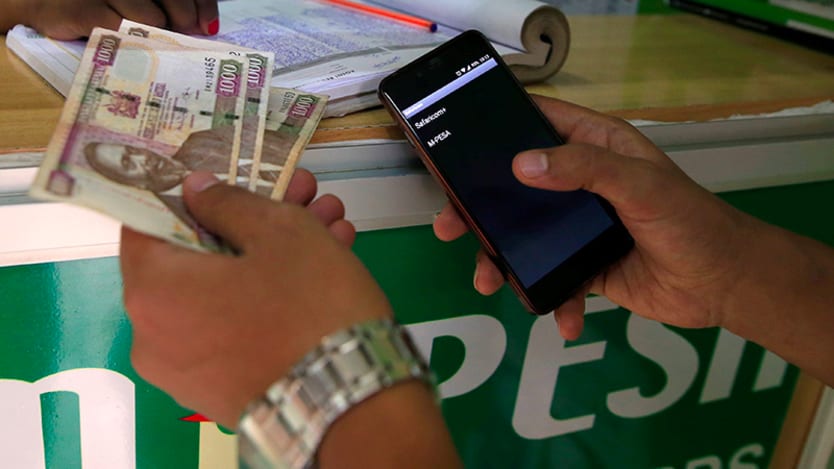
Back in 2002, the U.K. Department for International Development made a relatively modest but strategic investment in mobile phones and microfinance in Kenya, matching Vodafone’s investment of £1 million ($1.3 million) and extra support for Kenyan regulators at the central bank. From there, M-Pesa and Africa’s mobile-banking revolution were born. DFID’s decision rapidly transformed millions of people’s lives and livelihoods.
As so often happens with innovation, this initiative did not achieve its impact via its initial purpose — an efficient means to repay microfinance loans. It took off because it allowed the unbanked to safely and cheaply store and move money. From 2011 to 2017, the proportion of Kenyans with access to financial services doubled to over 80%. It empowered disserved families, many female-headed, to build better and more resilient livelihoods: By 2014, it had lifted 200,000 households out of poverty. It also proved that tech-based innovative development investments can deliver at scale, be sustainable, and meaningfully impact entire economies.
“National digital strategies must be firmly rooted in the local context, but international assistance in funding and know-how will be crucial to deliver them.”
— Stefan Dercon, former chief economist, DFIDAlmost two decades later, international donors have failed to capitalize on digital’s potential to effect large-scale change in poorer countries — and to recognize the crucial catalytic role they can play. The modus operandi of development organizations is still largely to spend on relatively small digital projects, investing in the next silver bullet offered by tiny social enterprises with little chance for scale, or in another database operating in isolation in some corner of government. However, while it is important to acknowledge the positive effects of innovation, it is worth noting the potential negative impacts of such technology, and specifically social media — for example, its apparent role in stoking ethnic violence in Ethiopia.
So why hasn’t the development donor mindset shifted alongside the incredible growth, reach, and potential of mobile phones and internet-enabled access, not to mention artificial intelligence and other digital technologies? Why haven’t we seen more and better models that go beyond the early example set by Kenya, and why aren’t donors thinking more strategically and leveraging digital in safe, scalable, and sustainable ways?
Research conducted over the last two years by the Pathways for Prosperity Commission on Technology and Inclusive Development, a global body of experts from public and private spheres, has concluded that digital technology can be a game-changer for developing countries — but it requires visionary leadership and some serious planning.
Just as the export manufacturing boom of the 1990s and 2000s was a key engine that lifted millions of people out of poverty in Asia, the digital age offers myriad ways — for those clearsighted enough to see the new reality — to switch on and diversify economies, create new jobs, transform agriculture, upgrade health and education systems, and ensure public services are accountable.
You only have to look at the people working in India and the Philippines now providing remote business services to global companies, how companies based in Nepal and Kenya label and organize data to train machine-learning algorithms, or the motorbike taxi apps proliferating in Indonesia to Uganda to see how technology is reshaping the way people live and work — and benefiting the least well-off. But it will be the countries that proactively create the conditions for digital growth that see the greatest results.
The Pathways Commission’s “Digital Manifesto,” based on the final report and launched on Nov. 13 in Nairobi, offers countries 10 steps to get ahead. It shows how lower- and middle-income countries can quickly work toward creating a countrywide digital strategy for inclusive development, which involves creating the essential infrastructure and digital building blocks such as digital payments or identity, boosting skills such as digital literacy, and sensible governance that is adaptable for a changing world — with concrete ideas on data governance, competition policy, and taxation.
The commission has been working with Ethiopia, Mongolia, and South Africa to support efforts to get government, the private sector, and civil society around the table to discuss the opportunities, trade-offs, and how they can ensure digital growth benefits the poor and marginalized. National digital strategies must be firmly rooted in the local context, but international assistance in funding and know-how will be crucial to deliver them. The priorities set out in the Pathways Commission’s “Digital Manifesto” can guide both countries and donors.
Digital certainly isn’t a cure-all — technologies can exaggerate broken systems if they are not deployed strategically and within an integrated and coordinated system. A recipe for failure will be the continuing practice of funding “one laptop per child” hardware or endless bespoke “one data system per government department” projects with no hope of ever integrating or even just using them. Digital change can also not be about parking another expert in the ICT department. It has to be about working across government, probably with presidential and prime ministerial offices, to deliver nationally owned digital strategies.
Digital change isn’t an “opt-in” for lower-income countries; it will happen whether or not they are strategic in their vision, planning, and investment choices. Countries must take charge and get ready now. International support must be delivered with a strategic view of the country’s digital capacity and supporting structure, and donors must intervene where they will have most impact.
Countries that fail to adapt will feel only the negative effects of digital technology. The gap between rich and poor will widen as some seize digital opportunities while others find that their jobs have become obsolete. Meanwhile, unchecked social media and data misuse has a huge potential to stoke social unrest. For donors, this will undermine the very development goals they seek to achieve. The stakes could not be higher.








